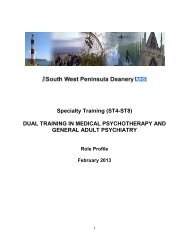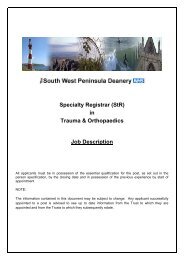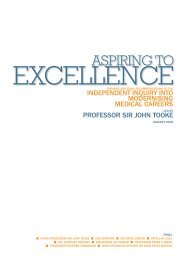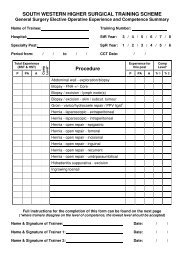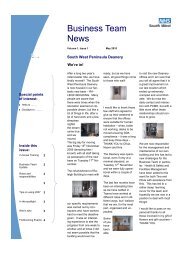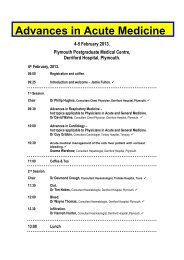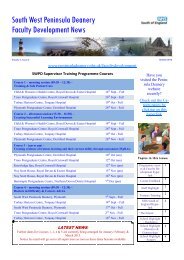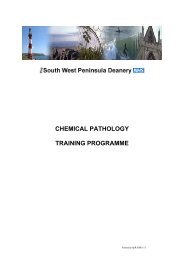A Guide to Core Psychiatry (CPT) Workplace Based Assessments ...
A Guide to Core Psychiatry (CPT) Workplace Based Assessments ...
A Guide to Core Psychiatry (CPT) Workplace Based Assessments ...
Create successful ePaper yourself
Turn your PDF publications into a flip-book with our unique Google optimized e-Paper software.
A <strong>Guide</strong> <strong>to</strong> <strong>Core</strong> <strong>Psychiatry</strong> (<strong>CPT</strong>) <strong>Workplace</strong> <strong>Based</strong><br />
<strong>Assessments</strong> (WPBAs) & ARCP<br />
Competence Attainment<br />
All trainees will have an Annual Review of Competence Progression (ARCP) organised by<br />
their deanery. This is described in the Gold <strong>Guide</strong> and replaces the RITA process. The key<br />
elements of this review are:<br />
Appraisal<br />
i. Educational<br />
ii. NHS<br />
Assessment of performance<br />
i. <strong>Workplace</strong> <strong>Based</strong> <strong>Assessments</strong> (WBAs)<br />
ii. Experience demonstrated e.g. from portfolio including audit, research and<br />
other aspects of non-clinical competence<br />
Planning<br />
Achievement of competencies will be considered in the Educational Supervisor’s Report and<br />
the Educational Supervisor will consider WPBA and other evidence such as examinations<br />
passed and experiential outcomes recorded in the portfolio. The competencies will be<br />
considered under 11 domains:<br />
i. Providing a good standard of practice and care<br />
ii. Decisions about access <strong>to</strong> care<br />
iii. Treatment in emergencies<br />
iv. Maintaining good medical practice<br />
v. Maintaining performance<br />
vi. Teaching and training, appraising and assessing<br />
vii. Relationships with patients<br />
viii. Dealing with problems in professional practice<br />
ix. Working with colleagues<br />
x. Maintaining probity<br />
xi. Ensuring that health problems do not put patients at risk<br />
Underlying Principles of <strong>Workplace</strong> <strong>Based</strong> <strong>Assessments</strong><br />
<strong>Workplace</strong> based assessments must comply with the following:<br />
They must focus on performance (i.e. what you actually do in the workplace)<br />
They must be evidence based<br />
Evidence must be triangulated whenever possible (i.e. it must be provided by<br />
different assessors, on different occasions, and if possible using different methods)<br />
Records must be permanent – assessment forms must not be lost or destroyed (this<br />
is achieved by online s<strong>to</strong>rage).<br />
Purpose of <strong>Workplace</strong> <strong>Based</strong> <strong>Assessments</strong><br />
The purpose of the workplace based assessments is twofold:<br />
Firstly, they have a formative function as the basis for feedback and educational<br />
planning. This helps included helping identify any specially focused teaching and<br />
learning that might be necessary <strong>to</strong> fill gaps or resolve weaknesses. You should have
WPBAS completed regularly throughout your placement <strong>to</strong> demonstrate effective review<br />
and appraisal. Therefore, do not leave them until the end of each stage of training or<br />
clinical placement.<br />
Secondly, although individually they have no ‘pass’ or ‘fail’ score, taken <strong>to</strong>gether WPBAs<br />
contribute <strong>to</strong> the Annual Review of Competence Progression (ARCP), which has a<br />
summative function providing evidence of the attainment of competencies. Successful<br />
completion of the ARCP process is manda<strong>to</strong>ry for eligibility for the MRCPsych<br />
examinations.<br />
Type of <strong>Workplace</strong> <strong>Based</strong> <strong>Assessments</strong><br />
There are 8 workplace based assessments currently available. These are described in detail<br />
in the trainee and assessor guidance for each WPBA <strong>to</strong>ol and are merely outlined below.<br />
Assessment of Clinical Expertise (ACE)<br />
The assessor observes a whole new patient encounter in order <strong>to</strong> be able <strong>to</strong> assess<br />
your ability <strong>to</strong> take a full his<strong>to</strong>ry and mental state examination and arrive at a diagnosis<br />
and management plan.<br />
Mini-Assessed Clinical Encounter (mini-ACE)<br />
The assessor observes part of a patient interaction, for example his<strong>to</strong>ry taking or<br />
negotiating a treatment plan, and rates your performance.<br />
Case-based Discussion (CbD)<br />
You select two sets of notes of patients you have recently seen and the assessor picks<br />
one <strong>to</strong> discuss. The discussion will allow demonstration of clinical decision-making and<br />
the application of clinical knowledge.<br />
Case Presentation (CP)<br />
This <strong>to</strong>ol can be used when you give clinical presentations and involves assessment of<br />
domains such as presentation skills and interpretation of evidence.<br />
Journal Club Presentation (JCP)<br />
This can be used when you present a journal article and covers domains such as<br />
analysis and critique and answering questions.<br />
Directly Observed Procedural Skills (DOPS)<br />
This has more limited use in psychiatry compared <strong>to</strong> other areas of medicine but can<br />
used in situations such as administering ECT.<br />
Mini-Peer Assessment Tool (mini-PAT)<br />
It allows co-workers <strong>to</strong> assess your attitudes and behaviours and ability <strong>to</strong> work well with<br />
colleagues.<br />
Assessment of Teaching (AoT)<br />
This is a new <strong>to</strong>ol that has been developed after feedback from the pilot programme. It<br />
allows an assessment <strong>to</strong> be made of teaching skills and may relate <strong>to</strong> a lecture, tu<strong>to</strong>rial<br />
or small group teaching session that you lead.<br />
Carrying out <strong>Workplace</strong> <strong>Based</strong> <strong>Assessments</strong><br />
You are responsible for organising your assessments. You should discuss the areas in<br />
which you need <strong>to</strong> be assessed with your Educational Supervisor and plan your WPBAs<br />
accordingly. Remember that you will need <strong>to</strong> be assessed by a range of different assessors<br />
in different situations <strong>to</strong> ensure triangulation of evidence. Don’t rely on your Educational<br />
Supervisor <strong>to</strong> perform all the assessments! Also remember that you must ask for the<br />
patient’s agreement when you perform a WPBA that involves a patient.<br />
There is an online system for the completion and s<strong>to</strong>rage of WPBAs. You can register for<br />
this through the College website and it can be accessed at http://training.rcpsych.ac.uk/.<br />
After you register you will be able <strong>to</strong> access the forms relevant <strong>to</strong> the manda<strong>to</strong>ry WPBAs (ie
ACE, mini-ACE, CbD and mini-PAT). Your assessors must then complete these<br />
assessments online.<br />
<strong>Workplace</strong> <strong>Based</strong> Assessment Requirements<br />
The learning needs of individual trainees will determine which competencies they need <strong>to</strong> be<br />
assessed in and the number of assessments that need <strong>to</strong> be performed; the College<br />
Assessment Programme’s eligibility structure should be regarded as a minimum number.<br />
Briefly, the number of WPBA’s stipulated in the Assessment Programme for CT1 and ST2&3<br />
is as follows<br />
Minimum Number required per year<br />
WPBA CT1 CT2 / ST2 CT3 / ST3<br />
Ace 2 3 3<br />
Mini-ACE 4 4 4<br />
CbD 2 2 2<br />
mini-PAT* 2 2 2<br />
Recommended Number per year<br />
WPBA CT1 CT2 / ST2 CT3 / ST3<br />
CP 1 1 1<br />
JCP 1 1 1<br />
DOPS<br />
As the opportunity arises<br />
AoT<br />
As the opportunity arises<br />
*There will be 5 rounds of mini-PAT’s per year of which 2 must be completed<br />
The guidelines in the above tables should be regarded as the minimum number of<br />
WPBAs: many trainees will need <strong>to</strong> do more, for example <strong>to</strong> provide additional evidence of<br />
achievement in a particular area of professional practice. It is important <strong>to</strong> again note that<br />
there is no ‘pass’ or ‘fail’ score for WPBA.<br />
You must note that, since they form the basis for feedback and educational planning, you<br />
must arrange WPBAs at appropriate intervals throughout your training rather than leaving<br />
them until the end of each stage. In particular, we strongly suggest that within the early<br />
stages of each phase of training or clinical placement (i.e. within the first month) you<br />
undertake a mini-ACE or ACE and a CbD. This is because these <strong>to</strong>ols reflect closely the<br />
expected day-<strong>to</strong>-day work of a psychiatric trainee both in terms of the assessment of cases<br />
and clinical reasoning and judgement. The purpose of these early assessments is <strong>to</strong> identify<br />
what you are doing well and in which areas you need <strong>to</strong> develop. They contribute valuable<br />
information <strong>to</strong> the educational planning of your placement. Therefore it is most unlikely that<br />
assessments made early will produce ratings consistent with performance at the standard<br />
expected for the completion of the stage of training.<br />
Educational Supervisors Report / College Tu<strong>to</strong>r’s Report<br />
The Educational Supervisor’s Report and the College Tu<strong>to</strong>r’s Report will be submitted for<br />
consideration by the ARCP. It is the ARCP that validates the achievement of competence<br />
after considering the presented portfolio information. It is important <strong>to</strong> note that as the ARCP
considers a range of evidence, it is possible for you <strong>to</strong> have performed well in your WPBAs<br />
but be considered by the ARCP panel <strong>to</strong> require further development. The outcomes for<br />
ARCP are described in the Gold <strong>Guide</strong> http://www.mmc.nhs.uk/Docs/A <strong>Guide</strong> <strong>to</strong><br />
Postgraduate Specialty Training in the UK (Gold <strong>Guide</strong>).doc<br />
Portfolio<br />
This replaces the previous College logbook. It allows you <strong>to</strong> collate other evidence in<br />
addition <strong>to</strong> your WPBA. A template can be found here on the Royal College of Psychiatrists<br />
Website:<br />
http://www.rcpsych.ac.uk/docs/Portfolio framework - May 2008 (2).doc<br />
This document is intended <strong>to</strong> provide a framework from which trainees can build a portfolio<br />
of evidence of their progress and attainment. It should be modified and adapted <strong>to</strong> suit<br />
individual training needs. Duplicate pages of each section should be created as necessary.<br />
This framework should be used electronically and updated regularly. It can then be printed<br />
out when necessary, for example for the Annual Review of Competence Progression.<br />
Suggested timetable for submission of WPBA’s<br />
This is a suggested timetable for a trainee in a six-month placement; schedules for individual<br />
trainees will vary depending upon local requirements and the trainee’s needs.<br />
Month 1 Month 2 Month 3 Month 4 Month 5 Month 6<br />
SPECIFIC FORMS TO BE SUBMITTED DURING CERTAIN MONTHS<br />
Individual<br />
learning plan<br />
1st self<br />
appraisal<br />
It is<br />
recommended<br />
that one of the<br />
patient<br />
encounter<br />
forms (ACE or<br />
mini-ACE) is<br />
completed now<br />
*Self appraisal<br />
form for 3<br />
months<br />
*Mid term<br />
assessment<br />
form<br />
Mini-Peer<br />
Assessment<br />
Tool<br />
*Self appraisal<br />
form (month<br />
5)<br />
OVER THE 6 MONTH PERIOD<br />
Combination of ACE/Mini ACE/CbD – <strong>to</strong>tal of 4 forms <strong>to</strong> be submitted during 6 month rotation<br />
Case Conference Presentation – at least 1 form <strong>to</strong> be submitted every 12 months<br />
Journal Club Presentation - at least 1 form <strong>to</strong> be submitted every 12 months<br />
AoT should be completed as the opportunity arises<br />
DOPS (for the those carrying out ECT) submit until lead clinician is satisfied with progress<br />
*Where these are required by your Trust and/or Programme, also note your local arrangements for<br />
submission of the Educational Supervisor’s Structured Report and workplace based (NHS) appraisal<br />
ARCP Requirements
Trainees are required <strong>to</strong> complete the following in preparation of their ARCP assessment.<br />
1. WPBAs completed as directed above<br />
2. Educational Supervisor Form – 1 completed for each rotation (e.g. 2 posts in 12<br />
months = 2 reports)<br />
3. College Tu<strong>to</strong>r Form<br />
4. Evidence of Psychotherapy Development<br />
5. Evidence of PCT training<br />
6. Portfolio (completed in accordance with the Royal College of Psychiatrists Portfolio<br />
Guidance inc. results of WPBAs and Exam Certificates) Must include:<br />
i. Evidence of Clinical Activity (logbook)<br />
ii. Educational Plan<br />
iii. Evidence of MRCPsych attendance<br />
iv. Exam Sitting / Results / Certificates<br />
v. NHS Appraisal<br />
vi. Any other evidence<br />
7. Confirmation of completion of PMETB survey<br />
8. Form R<br />
9. Any other evidence that they feel will be beneficial <strong>to</strong> the ARCP process<br />
All the information must be presented <strong>to</strong> the trainees’ Educational Supervisor / College Tu<strong>to</strong>r<br />
at the Pre-ARCP meeting. The Educational Supervisors / College Tu<strong>to</strong>r will make a<br />
recommendation of Outcome <strong>to</strong> the ARCP panel. Failure <strong>to</strong> produce this information will<br />
result the Educational Supervisors / College Tu<strong>to</strong>r recommending <strong>to</strong> the panel that an<br />
Unsatisfac<strong>to</strong>ry Outcome be issued. The trainee will then be required <strong>to</strong> meet with the panel<br />
and discuss the missing evidence and agree future action.<br />
Paperwork Required for ARCP<br />
Trainees will be required <strong>to</strong> submit prior <strong>to</strong> the ARCP the following documentation:<br />
Educational Supervisors Report (signed copy with original being retained by the trainee)<br />
College Tu<strong>to</strong>r Report (signed copy with original being retained by the trainee)<br />
Trainees who attend a face <strong>to</strong> face ARCP will also be expected <strong>to</strong> bring the following with<br />
documentation for review:<br />
Portfolio – completed in accordance with the Royal College of Psychiatrists Portfolio<br />
Guidance inc. results of WPBAs and Exam Certificates<br />
Educational Supervisors Report (original copy)<br />
College Tu<strong>to</strong>r Report (original copy)<br />
Evidence of Psychotherapy Development<br />
Any other evidence they feel will be beneficial<br />
Key Contact Details<br />
Head of School of <strong>Psychiatry</strong><br />
Dr Kate Lovett
Training Programme Direc<strong>to</strong>rs<br />
Child and Adolescent <strong>Psychiatry</strong><br />
General and Old Age <strong>Psychiatry</strong><br />
Forensic <strong>Psychiatry</strong><br />
Dr Sarah Huline-Dickens<br />
Dr Giles Richards<br />
Dr Eluned Dorkins<br />
Clinical Tu<strong>to</strong>rs<br />
Cornwall Partnership Trust<br />
Devon Partnership Trust<br />
North Devon Partnership Trust<br />
Plymouth Partnership Trust<br />
South Devon Partnership Trust<br />
Dr David Cox<br />
Dr Charles Dixon<br />
Dr Alison Collins<br />
Dr David Bicker<strong>to</strong>n<br />
Dr San Sreenath<br />
Regional Advisor<br />
Regional Advisor - Peninsula<br />
Dr Mike Metcalfe<br />
Deanery Contacts<br />
School Manager<br />
School Administra<strong>to</strong>r<br />
Heather Rowley<br />
Carla Miners



